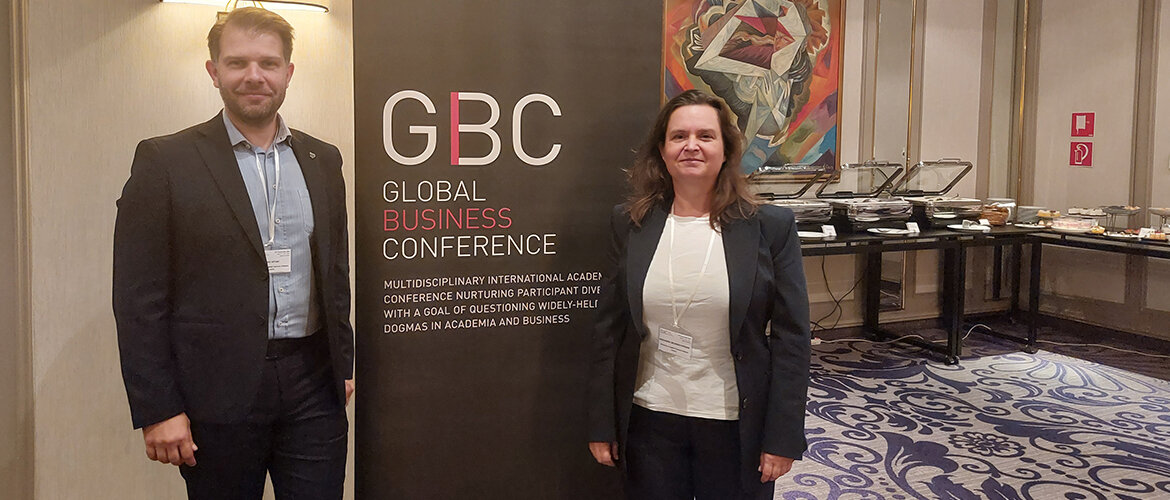Researchers at the 14th Global Business Conference 2023
- 09.10.2023
- Research

Prof. (FH) DDr. Mario Situm and Prof. (FH) Dr. Alexandra Brunner-Sperdin in front of the conference hall of the Global Business Conference.
At the annual conference in Zagreb, Croatia, which was held under the motto Doing business in a disrupted world, researchers presented their latest findings from the fields of finance and tourism & marketing.
This summer, the Global Business Conference once again attracted researchers from all over the world to present and discuss the latest findings from September 27 to 30, 2023. Two professors from the University of Applied Sciences Kufstein Tirol were also part of the international conference with new findings from the fields of finance and tourism & marketing. One of the two lecturers, Prof. (FH) DDr. Mario Situm, has been associated with this symposium for several years and is actively involved in the Academic Program Committee.
CORPORATE CRISES AND RESILIENCE IN THE HOTEL INDUSTRY
In a joint project, Prof. (FH) Dr. Alexandra Brunner-Sperdin and Prof. (FH) DDr. Mario Situm worked on the question of the extent to which the behavior of hotel businesses in Tyrol and Salzburg has changed as a result of the crisis and to what extent they have emerged stronger from it. To this end, the study team interviewed 21 entrepreneurs from small and medium-sized businesses in the hotel industry and used a qualitative content analysis to process the information obtained. The results showed that companies in Alpine tourism have been struggling with several crises since 2020. According to the managers, the causes of the crises are exogenous, i.e. factors over which the businesses have no influence (coronavirus pandemic, inflation and staff shortages).
In order to increase organizational resilience, tourism companies will have to work even more flexibly in the future. Resilience behavior in relation to the crises experienced has evolved significantly and entrepreneurs named several strategic (for example, business model development, robotics for service providers and more) and operational measures (for example, cost reduction, opening hours and more) to counteract crises and increase a company's resilience. However, the majority of respondents cited the ratio and availability of staff as a key resource in relation to implementing appropriate future countermeasures. The results also showed that companies' awareness of crises and the need for organizational resilience has increased.
STUDY ON THE FINANCIAL EDUCATION OF STUDENTS
Prof. (FH) DDr. Mario Situm presented the results of an empirical study supported by the Tiroler Wissenschaftsförderung des Landes Tirol (TWF), conducted and analyzed by Lukas Hartleif, MA, BA, and Prof. (FH) Dr. Dominika Galkiewicz. The aim of the study was to find out the level of knowledge and experience of Englisch and Austrian students with regard to selected capital market products and their general risk aversion with regard to investments. The results of the 231 complete questionnaires showed that female students have significantly less knowledge than male students with regard to the capital market instruments funds and ETFs (exchange-traded funds, an exchange-traded index fund). In addition, female students show a significantly higher aversion to losses, which suggests that they are less risk averse. There were no statistically significant differences in knowledge of capital market instruments and aversion to losses between generations Y (born in the early 1980s to the late 1990s) and Z (from around 1997). The gender of the students is therefore an important variable in explaining the difference in the level of financial literacy. The participants discussed the results in plenary and considered them to be very interesting and informative. This resulted in suggestions for a potential publication of the results as an international specialist article.
THE ADVANTAGES OF AN INTERNATIONAL RESEARCH CONFERENCE
The experience gained from attending the conference once again showed how important it is to network with other researchers and engage in discussions with them in order to get to know different points of view. Important insights and perspectives emerged from the many discussions that were held, which are helpful for further research. In addition, participation is also an excellent indicator to see which research topics colleagues from other countries are working on and to what extent their own research efforts are relevant and gain recognition in the scientific community.
